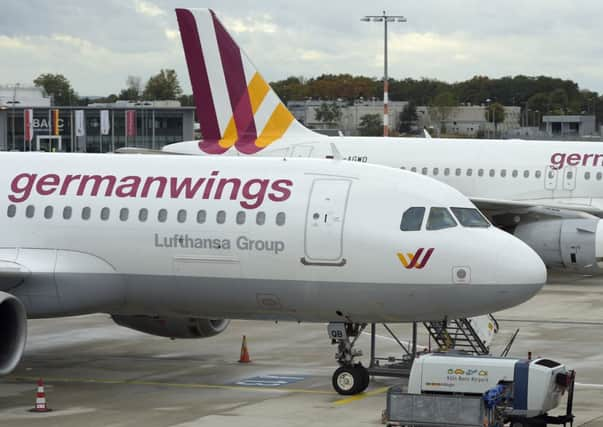Evidence of crash victims discovered


The crash site’s mountainous terrain has meant that the recovery teams have been confined to reaching the area on foot and by helicopter but reports suggest that the painstaking task is beginning to turn up results.
Fragments from the downed airliner are also being searched for and the German Airline Pilots Association said the aircraft’s flight data recorder was still missing.
Advertisement
Hide AdAdvertisement
Hide AdFamily members continue to travel to the site of the crash, the BBC said last night, with investigators having now isolated some 78 different strands of DNA from some of the victims.
The progress came as more questions were asked over the mental and physical health of German co-pilot Andreas Lubitz who, reports suggest, may have been receiving treatment for vision problems before he steered the aircraft into the mountain range in France.
Lubitz locked the captain out of the Airbus’ cockpit before he brought down the airliner, en route from Barcelona to Dusseldorf on Tuesday last week.
Authorities have already revealed he hid from his employers a sick note declaring him unfit to work on the day of the disaster and German newspaper Bild has said that he previously told an ex-girlfriend: “One day I will do something that will change the whole system, and then all will know my name and remember it.”
Advertisement
Hide AdAdvertisement
Hide AdSpeaking from near the crash site at the weekend, Philip Bramley, of Hull, whose son Paul, 28, was one of the three Britons on the flight called for more to be done to see pilots were “looked after”.
The Observer reported that Civil Aviation Authority documents suggested some 100 commercial airline pilots in the UK had a history of depression, with 42 still on medication.
Mr Bramley said the mass tragedy should never be repeated and that everyone on the crashed plane should not be forgotten.
“I believe the airlines should be more transparent and our finest pilots looked after properly. We put our lives and our children’s lives in their hands,” he said.
Advertisement
Hide AdAdvertisement
Hide AdMeanwhile, today, the ongoing scrutiny of Lubitz’s health prompted a leading British psychiatrist to speak out.
Professor Sir Simon Wessely, president of the Royal College of Psychiatrists (RCPsych), said pilots with a history of depression should not be banned from flying commercial jets.
He told the Observer that the aviation industry should not “rush” to action. He cited health authorities’ response to the crimes of Dr Harold Shipman, who is thought to have killed between 215 and 260 people, as an example of ineffective policy.
Sir Simon said: “It is not a good idea to rush; it is like the response to Dr Shipman, an utterly bizarre and unpredictable event is not a good basis of policy. The procedures that they then brought in would not have prevented Shipman.
Advertisement
Hide AdAdvertisement
Hide Ad“I have dealt with some pilots with depression and when they recover they are still monitored. But the two I have dealt with returned to very successful careers. Why should they not?
“What does cause trouble is saying that if you ever have a history of depression then you should not be allowed to do whatever. That is wrong, as much as saying that people with a history of broken arms shouldn’t be allowed to do something.”
Elsewhere today, Pope Francis prayed for all those who were killed in the crash as he opened solemn Holy Week services with Palm Sunday Mass in St Peter’s Square in front of some 70,000 faithful.